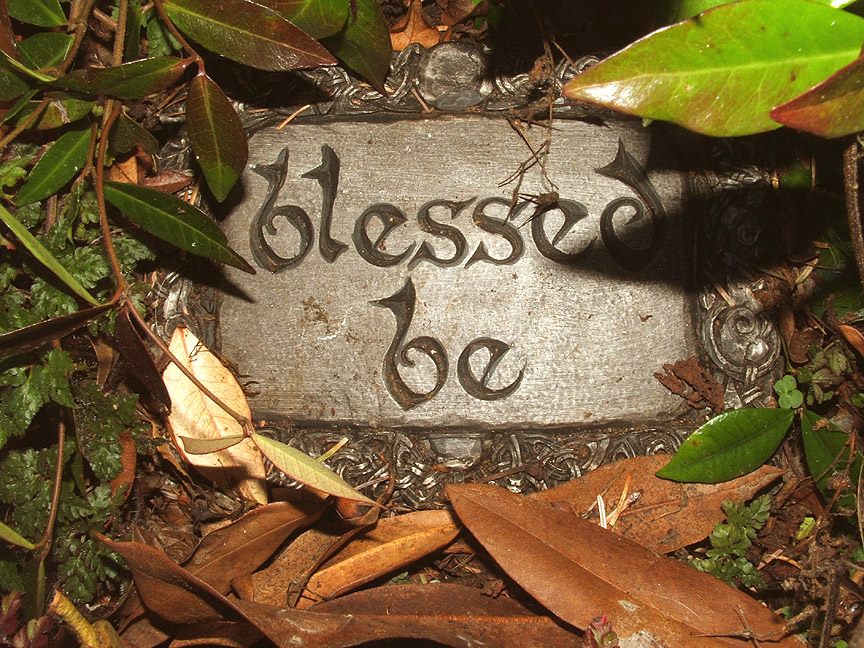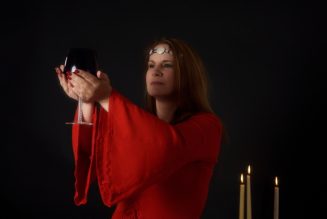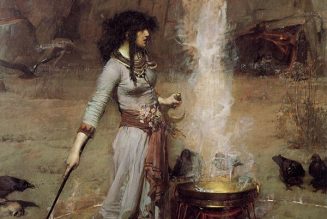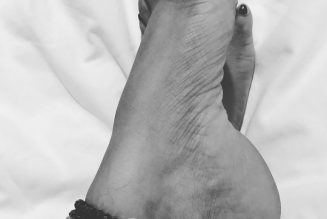
The phrase “blessed be” is found in many modern magical traditions. Although it appears in some Pagan paths, it’s typically more likely to be used in a NeoWiccan context. It’s often used as a greeting, and to say “Blessed be” to someone indicates that you wish good and positive things upon them.
The phrase’s origins are a bit more murky. It is part of a longer ritual which is included in some Gardnerian Wiccan initiation ceremonies.
During that rite, the High Priest or High Priest delivers what it known as the Five Fold Kiss, and recites,
Blessed be thy feet, which have brought thee in these ways,
Blessed be thy knees, that shall kneel at the sacred altar,
Blessed be thy womb, without which we would not be,
Blessed be thy breasts, formed in beauty,
Blessed be thy lips, that shall utter the Sacred Names of the gods.
It’s important to keep in mind that Wicca is a newer religion, and many of its terms and rituals are rooted in Thelema, ceremonial magic, and hermetic mysticism. As such, it’s not surprising that many phrases–including “Blessed be”–appear in other places long before Gerald Gardner incorporated them into his original Book of Shadows.
In fact, the King James Bible includes the verse, “Blessed be the name of the Lord.”
“BLESSED BE” OUTSIDE OF RITUAL
Many times, people use the phrase “blessed be” as a greeting or parting salutation.
But, if this is a phrase rooted in the sacred, should it be used in a more casual context? Some people don’t think so.
Some practitioners feel that the use of sacred phrases like “Blessed be” should only be used within the orthopraxic context of traditional Wiccan practice, i.e. in rituals and ceremonies.
In other words, using it outside of the context of the spiritual and sacred is simply inappropriate.
On the other hand, some people use it as part of regular, non-ritual conversation. BaalOfWax follows a NeoWiccan tradition, and he says,
“I use blessed be as a greeting outside of ritual when I’m saying hello or goodbye to other Pagans and Wiccans, although I generally reserve it for people I’ve stood in circle with, rather than casual acquaintances. If I’m writing an email that’s coven related, I usually sign off with blessed be, or just BB, because everyone understands the usage. What I don’t do, though, is use it when I’m talking to my grandma, my co-workers, or the cashier at the Piggly Wiggly.”
In April 2015, Wiccan priestess Deborah Maynard delivered the first prayer by a Wiccan in the Iowa House of Representatives, and included the phrase in her closing remarks. Her invocation ended with:
“We call this morning to Spirit, which is ever present, to help us respect the interdependent web of all existence of which we are a part. Be with this legislative body and guide them to seek justice, equity and compassion in the work that is before them today. Blessed Be, Aho, and Amen.”
DO I HAVE TO USE “BLESSED BE”?
Like many other phrases in the Pagan lexicon, there is no universal rule that you must use “Blessed Be” as a greeting or in a ritual context, or even at all.
The Pagan community tends to be divided on this; some people use it on a regular basis, others feel uncomfortable saying it because it’s just not part of their liturgical vocabulary. If using it feels forced or insincere to you, then by all means, skip it. Likewise, if you say it to someone and they tell you they’d rather you didn’t, then respect their wishes the next time you encounter that individual.
Megan Manson of Patheos says,
“The expression just wishes blessings upon someone, from a non-specific source. This seems to fit Paganism very well; with such a variety of deities, and indeed with some forms of Paganism and witchcraft having no deities at all, wishing blessings upon another without reference to where those blessings are coming from would be appropriate for any Pagan, no matter what their individual creed.”
If your tradition requires it, then feel free to incorporate it in ways that feel natural and comfortable and appropriate. Otherwise, it’s a matter of personal preference. The choice to use “Blessed Be,” or to not use it at all, is entirely up to you.








